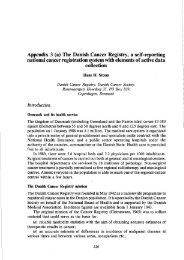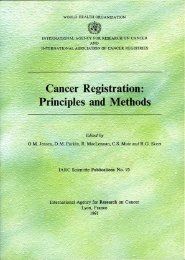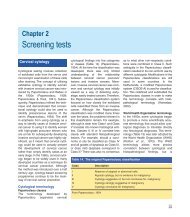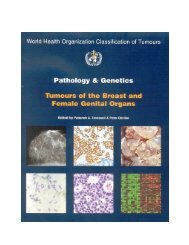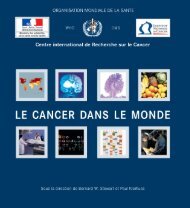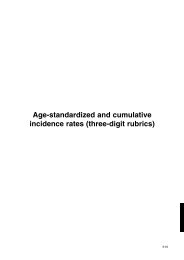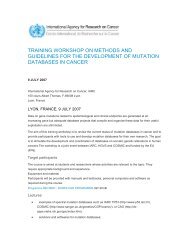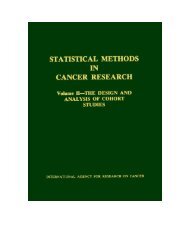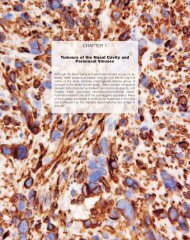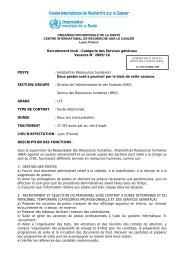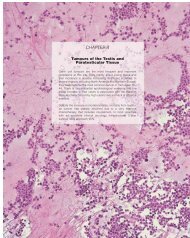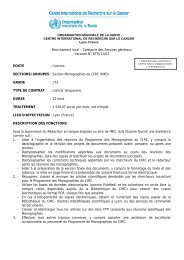GC/52/2 - IARC
GC/52/2 - IARC
GC/52/2 - IARC
Create successful ePaper yourself
Turn your PDF publications into a flip-book with our unique Google optimized e-Paper software.
Références<br />
Chaudru V, Lo MT, Lesueur F, Marian C, Mohamdi<br />
H, Laud K, Barrois M, Chompret A, Avril MF, Demenais<br />
F, Paillerets BB (2009). Protective effect of<br />
copy number polymorphism of glutathione S-transferase<br />
T1 gene on melanoma risk in presence of<br />
CDKN2A mutations, MC1R variants and host-related<br />
phenotypes. Fam Cancer. May 31.<br />
Easton DF, Eeles RA (2008). Genome-wide association<br />
studies in cancer. Hum Mol Genet<br />
17(R2):R109-R115. PMID: 188<strong>52</strong>198<br />
Lesueur F, de Lichy M, Barrois M, Durand G, Bombled<br />
J, Avril MF, Chompret A, Boitier F, Lenoir GM;<br />
French Familial Melanoma Study Group, Bressac-de<br />
Paillerets B (2008). The contribution of large genomic<br />
deletions at the CDKN2A locus to the burden of<br />
familial melanoma. Br J Cancer. Jul 22;99(2):364-70.<br />
Maher B. Personal genomes: The case of the missing<br />
heritability. Nature 456:18-21, 2008. PMID:<br />
18987709<br />
Garritano S, Gemignani F, Palmero EI, et al. High<br />
frequency of the cancer-predisposing TP53 mutation<br />
p.R337H in the population of Southern Brazil:<br />
evidence for a founder effect Hum Mutat (sous<br />
presse).<br />
Garritano S, Gemignani F, Voegele C, et al. (2009).<br />
Determining the effectiveness of high resolution<br />
melting analysis for SNP genotyping and mutation<br />
scanning at the TP53 locus. BMC Genetics 10:5.<br />
Goldgar DE, Easton DF, Byrnes GB, Spurdle AB,<br />
Iversen ES, Greenblatt MS, for the <strong>IARC</strong> Unclassified<br />
Genetic Variants Working Group (2008). Genetic<br />
evidence and integration of various data sources<br />
for classifying uncertain variants into a single model.<br />
Hum Mutat 29(11):1265-1272.<br />
Greenblatt MS, Brody LC, Foulkes WD, et al., for<br />
the <strong>IARC</strong> Working Group on Classifying Genetic<br />
Variants (2008). Locus-specific databases and recommendations<br />
to strengthen their contribution to<br />
the Classification of Variants in Cancer Susceptibility<br />
Genes. Hum Mutat 29(11):1273-1281.<br />
Spurdle AB, Couch FJ, Hogervorst FBL, Radice P,<br />
Silninikova OM, for the <strong>IARC</strong> Unclassified Genetic<br />
Variants Working Group (2008). Prediction and assessement<br />
of splicing alterations: implications for<br />
clinical testing. Hum Mutat 29(11):1304-1313.<br />
Spurdle AB, Lakhani SR, Healey S, et al., for the<br />
kConFab Investigators (2008). Clinical classification<br />
of BRCA1 and BRCA2 sequence variants: the value<br />
of cytokeratin profiles and evolutionary analysis – A<br />
report from the kConFab Investigators. J Clin Oncol<br />
26(10):1657-63.<br />
Tavtigian SV, Byrnes GB, Goldgar DE, Thomas<br />
A (2008). Classification of rare missense substitutions,<br />
using risk surfaces, with genetic- and<br />
molecular-epidemiology applications. Hum Mutat<br />
29(11):1342-1354.<br />
Tavtigian SV, Greenblatt MS, Goldgar DE, Boffetta P,<br />
for the <strong>IARC</strong> Unclassified Genetic Variants Working<br />
Group (2008). Assessing pathogenicity: overview of<br />
results from the <strong>IARC</strong> Unclassified Genetic Variants<br />
Working Group. Hum Mutat 29(11):1261-1264.<br />
Publications<br />
Arnold S, Buchanan DD, Barker M, et al. (2009).<br />
Classifying MLH1 and MSH2 variants using bioinformatic<br />
prediction, splicing assays, segregation,<br />
and tumor characteristics. Hum Mutat [Epub avant<br />
pub.] PMID: 19267393.<br />
Campa D, McKay J, Sinilnikova O, et al. (2009). Genetic<br />
variation in genes of the fatty acid synthesis<br />
pathway and breast cancer risk. Breast Cancer Res<br />
Treat. [Epub avant pub.] PMID: 192<strong>52</strong>981.<br />
Cotton RGH, Auerbach AD, Axton M, et al.<br />
(2008). The human variome project – the collection<br />
of variation affecting human health. Science<br />
322(5903):861-862.<br />
Couch FJ, Rasmussen LJ, Hofstra R, Monteiro ANA,<br />
Greenblatt MS, de Wind N for the <strong>IARC</strong> unclassified<br />
genetic variants working group (2008). Assessment<br />
of functional effects of unclassified variants. Hum<br />
Mutat 29(11):1314-1326.<br />
Distelman Menachem T, Shapira T, et al. (2009).<br />
Analysis of BRCA1-BRCA2 genes’ contribution to<br />
breast cancer susceptibility in high risk Jewish Ashkenazi<br />
women. Familial Cancer 8:127-133.<br />
Hammet F, George J, Tesoriero AA, et al. (2008).<br />
Is BRCA2 c.9079 G>A a predisposing variant for<br />
early onset breast cancer. Breast Cancer Res Trea,<br />
109(1):177-9.<br />
Hofstra RMW, Spurdle AB, Eccles D, et al., for the<br />
<strong>IARC</strong> unclassified genetic variants working group<br />
(2008). Tumor characteristics as an analytic tool for<br />
classifying genetic variants of uncertain clinical significance.<br />
Hum Mutat 29(11):1292-1303.<br />
Jordheim LP, Nguyen-Dumont T, Thomas X, Dumontet<br />
C, Tavtigian SV (2008). Differential allelic<br />
expression in leucoblast from patients with acute<br />
myeloid leukemia suggests genetic regulation of<br />
CDA, DCK, NT5C2, NT5C3 and TP53. Drug Metab<br />
Dispos 36(12):2419-2423.<br />
Kaput J, Cotton RG, Hardman L, et al., on behalf of<br />
contributors to the Human Variome Project Planning<br />
Meeting (2009). Planning the Human Variome Project:<br />
The Spain report. Hum Mutat 30(4):496-510.<br />
Nguyen-Dumont T, Le Calvez-Kelm F, Forey N, et al.<br />
(2009). Description and validation of high-throughput<br />
simultaneous genotyping and mutation scanning<br />
by high-resolution melting curve analysis. Hum<br />
Mutat 30(6):884-90.<br />
Tavtigian SV, Greenblatt MS, Lesueur F, Byrnes GB,<br />
for the <strong>IARC</strong> Unclassified Genetic Variants Working<br />
Group (2008). In silico analysis of missense substitutions<br />
using sequence-alignment based methods.<br />
Hum Mutat 29(11):1327-1336.<br />
Tavtigian SV, Oefner PJ, Hartmann A, et al. Rare<br />
evolutionarily unlikely missense substitutions in<br />
ATM confer increased risk of breast cancer. Am J<br />
Hum Genet (sous presse).<br />
Tischkowitz M, Hamel N, Carvalho MA, et al.<br />
(2008). Pathogenicity of a BRCA1 missense variant<br />
M1775K is determined by the disruption of the BRCT<br />
phosphopeptide-binding pocket: a multi-modal approach.<br />
Eur J Hum Genet 16(7), 820-32.<br />
Tischkowitz MD, Yilmaz A, Chen LQ, et al. (2008).<br />
Identification and characterization of novel SNPs in<br />
CHEK2 in Ashkenazi Jewish men with prostate cancer.<br />
Cancer Lett 270(1):173-180.<br />
Réunions organisées<br />
par le Groupe Prédispositions<br />
génétiques au cancer<br />
Unclassified Variants Clinical Interpretation Workshop<br />
– Lyon, France - 4-5 février 2008<br />
Farrugia D, Agarwal M, Deffenbaugh AM, et al.<br />
(2008). Cancer risk assessment of BRCA2 missense<br />
variants of unknown clinical significance<br />
by functional and genetic analysis. Cancer Res<br />
68(9):3<strong>52</strong>3-31.<br />
104 rapport biennal 2008/2009<br />
Plon SE, Eccles DM, Easton D, et al., for the <strong>IARC</strong><br />
Unclassified Genetic Variants Working Group<br />
(2008). Sequence variant classification and reporting:<br />
recommendations for improving the interpretation<br />
of cancer susceptibility genetic test results.<br />
Hum Mutat 29(11):1282-1291.<br />
Unclassified Variants in Mismatch Repair Genes<br />
Working Group – Lyon, France - 19-20 février 2009



